|
|
|
Sort Order |
|
|
|
Items / Page
|
|
|
|
|
|
|
| Srl | Item |
| 1 |
ID:
069057
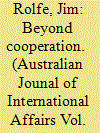

|
|
|
| 2 |
ID:
102364
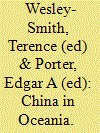

|
|
|
|
|
| Publication |
New York, Berghahn Books, 2010.
|
| Description |
x, 228p.
|
| Series |
Foundations in Asia Pacific studies; v.1
|
| Standard Number |
978184545632
|
|
|
|
|
|
|
|
|
|
|
|
Copies: C:1/I:0,R:0,Q:0
Circulation
| Accession# | Call# | Current Location | Status | Policy | Location |
| 055793 | 303.48/WES 055793 | Main | On Shelf | General | |
|
|
|
|
| 3 |
ID:
146480
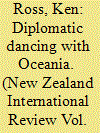

|
|
|
| 4 |
ID:
097819
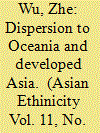

|
|
|
|
|
| Publication |
2010.
|
| Summary/Abstract |
Since most of South Asian Tibetan refugees have not secured formal immigration status in their host countries, their dispersion has expanded to other continents. Compared to those Tibetans living in South Asia, Europe and North America, Tibetans in Australia and New Zealand emigrated there on their own, married citizens, or went to study, work, or engage in religious or cultural activities. Tibetan diasporization in Oceania has proven successful. There are only around 60 Tibetans residing in Japan, some of them hold a Taiwanese (Republic of China) passport, which makes it easier to obtain a Japanese visa, and others are fulltime staff members of the liaison office of the Dalai Lama in Japan. Under Seoul's stringent immigration laws, less than 20 Tibetans reside in South Korea, mostly on work visas. Tibetan exiles and their supporters often protest to the Visiting Chinese Leaders or Embassy of China in Oceania and developed Asian countries.
|
|
|
|
|
|
|
|
|
|
|
|
|
|
|
|
| 5 |
ID:
166110
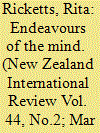

|
|
|
|
|
| Summary/Abstract |
Rita Ricketts reviews an exhibition that has recently been held in London and Paris.
|
|
|
|
|
|
|
|
|
|
|
|
|
|
|
|
| 6 |
ID:
093464
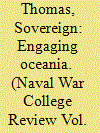

|
|
|
| 7 |
ID:
184239
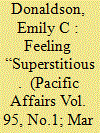

|
|
|
|
|
| Summary/Abstract |
For many Indigenous peoples, ancestral lands are a source of nourishment, strength, and sovereignty that counteracts colonial legacies of violence and hegemony. However, the feelings associated with place and the land can also be complicated by embodied fear and ambivalence. What happens when the remnants of colonialism feed feelings of ambivalence, shame, or fear of the land? How do these lasting emotional scars on Indigenous minds and bodies impact Native place making, today? This paper problematizes the role of ancestral lands and affective place making in shaping Indigenous identity, sovereignty, resource management, and sustainability. In the Marquesas Islands of French Polynesia, ancestral places are felt as much as seen, and the spirits that dwell there can be dangerous. The active concealment of these Marquesan reactions and relationships to place illustrates the blending of colonial and Indigenous histories and values in ambivalent, affective experiences on the land. Thus, even as islanders work to revitalize their traditional culture and build a sustainable future based on ancestral places, reticence complicates local relationships to the land and the vital hopes they represent. As global sustainability efforts emphasize the conservation of lands inhabited by Indigenous communities, recognizing the conflicted, emplaced emotions and experiences of local peoples will be a key part of understanding such areas and how to preserve them.
|
|
|
|
|
|
|
|
|
|
|
|
|
|
|
|
| 8 |
ID:
102462
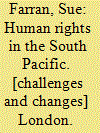

|
|
|
|
|
| Publication |
London, Routledge, 2009.
|
| Description |
xxv, 337p.
|
| Standard Number |
9781844721094, hbk
|
|
|
|
|
|
|
|
|
|
|
|
Copies: C:1/I:0,R:0,Q:0
Circulation
| Accession# | Call# | Current Location | Status | Policy | Location |
| 055852 | 323.0995/FAR 055852 | Main | On Shelf | General | |
|
|
|
|
| 9 |
ID:
136986


|
|
|
|
|
| Publication |
New Delhi, Indian council of world Affairs, 2015.
|
| Description |
344p.Pbk
|
| Standard Number |
9789383445202
|
|
|
|
|
|
|
|
|
|
|
|
Copies: C:1/I:0,R:0,Q:0
Circulation
| Accession# | Call# | Current Location | Status | Policy | Location |
| 058165 | 327.5/BHA 058165 | Main | On Shelf | General | |
|
|
|
|
| 10 |
ID:
158314
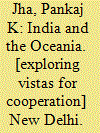

|
|
|
|
|
| Publication |
New Delhi, Pentagon Press, 2016.
|
| Description |
xiv, 231p.hbk
|
| Standard Number |
9788182748569
|
|
|
|
|
|
|
|
|
|
|
|
Copies: C:1/I:0,R:0,Q:0
Circulation
| Accession# | Call# | Current Location | Status | Policy | Location |
| 059363 | 303.48254095/JHA 059363 | Main | On Shelf | General | |
|
|
|
|
| 11 |
ID:
189908
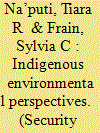

|
|
|
|
|
| Summary/Abstract |
This article centers Indigenous epistemologies to critique the United States oceanic security state, a modality of militarization and blue-washing conservation that extends beyond land borders to encompass federal conceptualizations of national security throughout the Pacific Ocean. Beginning with Indigenous perspectives from Oceania, it provides examples of Indigenous peoples’ continuing connections to ocean spaces and challenges to United States colonial geographic imaginaries and militarized destruction. Then, advancing the concept of the oceanic security state, it examines how United States assertions of sovereignty over Oceania are used to justify hyper-militarization while simultaneously destroying the environment and contributing to the climate crisis. These phenomena occur while the USA remains exempt from federal environmental conservation laws through ‘blue-washing’, and the United States government benefits from the exclusion of military emission data within international climate targets. The findings reveal how militarizing all ocean space in the name of United States national security operates within delineated borders of Exclusive Economic Zones, Marine National Monuments, and Marine Protected Areas. Guided by Indigenous epistemologies, the article concludes with alternative ways of understanding ocean spaces and constructing futures of genuine security.
|
|
|
|
|
|
|
|
|
|
|
|
|
|
|
|
| 12 |
ID:
079669
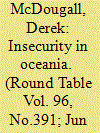

|
|
|
|
|
| Publication |
2007.
|
| Summary/Abstract |
During the Cold War security concerns in Oceania were predominantly state-centred, involving such issues as 'strategic denial' in relation to the USSR, French nuclear testing and the Kanak demand for independence in New Caledonia. In the post-cold war era 'comprehensive security' provides a useful framework for assessing security in Oceania. This framework covers various issues, including political and societal security (particularly failing states), economic security, environmental security and various new international agenda issues (such as organized crime, terrorism and health). 'Enhanced regionalism' has been an important response to these various challenges. Australia has assumed a leading role in the development of this response, and also led the international intervention in Solomon Islands in 2003. Stronger regional cooperation is likely to result from the Pacific Plan, although not to the extent sought by Australia. The response to insecurity in Oceania needs to focus on long-term development issues.
|
|
|
|
|
|
|
|
|
|
|
|
|
|
|
|
| 13 |
ID:
109469
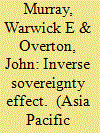

|
|
|
|
|
| Publication |
2011.
|
| Summary/Abstract |
Theories and practices of international aid have stressed the need for the full participation of recipients. This approach has been strengthened by international agreements such as the Paris Declaration on Aid Effectiveness in 2005, which called for 'ownership' of development strategies by recipient agencies. This seemed to promise recipient governments an increased stake in the way aid was used for development and poverty alleviation. However, in practice, the new aid agenda has actually increased demands on recipients with new conditions over the management of aid funds, the setting of development strategies and the meeting of other global obligations. This issue is of particular concern in small Pacific Island states where the small size of government is coupled with increasing demands from donors for consultation, accountability and engagement to create what we argue is an 'inverse sovereignty' effect: despite the rhetoric of ownership and independence, recipient states are actually losing control over their development strategies, policies and programmes.
|
|
|
|
|
|
|
|
|
|
|
|
|
|
|
|
| 14 |
ID:
127353
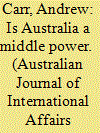

|
|
|
|
|
| Publication |
2014.
|
| Summary/Abstract |
This article examines whether Australia is a middle power. It identifies the three most popular approaches to defining a middle power: by a country's position, behaviour and identity. The article tests each definition against Australia, highlighting the strengths and weaknesses of each. Highlighting an earlier systemic approach to defining states, an alternative 'systemic impact' definition for middle powers is proposed. This approach, it is argued, provides a more comprehensive manner for identifying whether a country like Australia is a middle power, along with the implications for international security.
|
|
|
|
|
|
|
|
|
|
|
|
|
|
|
|
| 15 |
ID:
113552
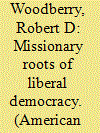

|
|
|
|
|
| Publication |
2012.
|
| Summary/Abstract |
This article demonstrates historically and statistically that conversionary Protestants (CPs) heavily influenced the rise and spread of stable democracy around the world. It argues that CPs were a crucial catalyst initiating the development and spread of religious liberty, mass education, mass printing, newspapers, voluntary organizations, and colonial reforms, thereby creating the conditions that made stable democracy more likely. Statistically, the historic prevalence of Protestant missionaries explains about half the variation in democracy in Africa, Asia, Latin America and Oceania and removes the impact of most variables that dominate current statistical research about democracy. The association between Protestant missions and democracy is consistent in different continents and subsamples, and it is robust to more than 50 controls and to instrumental variable analyses.
|
|
|
|
|
|
|
|
|
|
|
|
|
|
|
|
| 16 |
ID:
124275
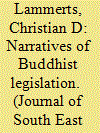

|
|
|
|
|
| Publication |
2013.
|
| Summary/Abstract |
For more than a century scholars of central and western mainland Southeast Asia have sought to characterise the status of dhammasattha - the predominant genre of written law from the region before colonialism - and define its authority vis-à-vis Pali Buddhism. For some, dhammasattha texts represent a predominantly 'secular' or 'customary' tradition, while for others they are seen as largely commensurate with, if not directly derived from, the religio-political ideas of a cosmopolitan and purportedly canonical 'Therav?da'. However, scholarship has yet to investigate the way that regional authors during the late premodern period themselves understood the character and legitimacy of written law. The present article examines seventeenth through nineteenth-century Burmese narratives concerning the genealogy and status of dhammasattha to advance a pluralist conception of the relationship between law and religion in Southeast Asian history. This analysis addresses a historical context where ideas concerning Buddhist textual authority were in the process of development, and where there were multiple and competing discourses of legal ideology in play. For elite monastic critics closely connected with royalty, dhammasattha stood in problematic relation to authoritative taxonomies of scripture, and its jurisprudence was seen to contradict authorised accounts of the origin and nature of Buddhist law; the genre thus required reform to be brought into alignment with what were construed as orthodox legal imaginaries. The principal hermeneutic move these monastic commentators performed to achieve this involved redescribing dhammasattha in light of such accounts as a variety of Buddhist royal legislation and written law as the prerogative of the Buddhist state.
|
|
|
|
|
|
|
|
|
|
|
|
|
|
|
|
| 17 |
ID:
103081
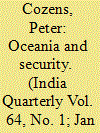

|
|
|
| 18 |
ID:
074963
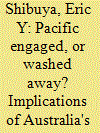

|
|
|
|
|
| Publication |
2006.
|
| Summary/Abstract |
A multilateral regional intervention into the Solomon Islands in 2003 was led and staffed primarily by Australia. The Regional Assistance Mission to the Solomon Islands signals a sea change in the way Australia views its place in the region, and its subsequent activities ('enhanced cooperation' in Papua New Guinea, and the unprecedented election of an Australian as Secretary General of the Forum) suggest that Australia may now be willing to play a more active (and activist) role in Oceania. Much of the drive for this activism, however, is being driven by events and perceptions of threats from outside of 'Oceania', especially from Southeast Asia. Rather than reifying conceptualizations of what a 'region' is, policy-makers would do better to understand how events from one region can drive policy in another. This in fact makes the effectiveness of regional institutions even more important to build multilateral agreements that extend even further than before.
|
|
|
|
|
|
|
|
|
|
|
|
|
|
|
|
| 19 |
ID:
127801
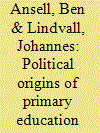

|
|
|
|
|
| Publication |
2013.
|
| Summary/Abstract |
This paper is concerned with the development of national primary education regimes in Europe, North America, Latin America, Oceania, and Japan between 1870 and 1939. We examine why school systems varied between countries and over time, concentrating on three institutional dimensions: centralization, secularization, and subsidization. There were two paths to centralization: through liberal and social democratic governments in democracies, or through fascist and conservative parties in autocracies. We find that the secularization of public school systems can be explained by path-dependent state-church relationships (countries with established national churches were less likely to have secularized education systems) but also by partisan politics. Finally, we find that the provision of public funding to private providers of education, especially to private religious schools, can be seen as a solution to religious conflict, since such institutions were most common in countries where Catholicism was a significant but not entirely dominant religion.
|
|
|
|
|
|
|
|
|
|
|
|
|
|
|
|
| 20 |
ID:
148212
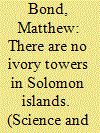

|
|
|
|
|
| Summary/Abstract |
After a long day, I gather the last of my concentration and walk to the base of an isolated tree. It’s a cloudy night, so as I hug the trunk I rely on my bare feet to locate the notches that have been hacked into the bark. The tree is still slick from the evening’s rain, so I gingerly scramble up the trunk, climb between swaying branches, and haul myself over the railing of a tree house.
|
|
|
|
|
|
|
|
|
|
|
|
|
|
|
|
|
|
|
|
|